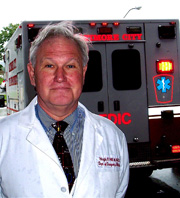Conversations with America
Conversations with America: Dr. Hugh Hill
Hugh Hill
David Schulman
OCTOBER 4, 2008
- Dr. Hugh Hill
- (David Shulman)
- Enlarge This Image
Web Resources
Related Stories
- Conversations with America: Concluding the Conversation
- Conversations with America: le thi diem thuy
- Conversations with America: Oliver Sacks
- Conversations with America: Annette Gordon-Reed
More From Hugh Hill
More From David Schulman
Our heads are spinning as the election draws near. The weekend used to be a bit of a breather, but these days, the news cycle keeps churning through Saturday and Sunday. Still, it can be a place to step back just a little and look at priorities. We've been asking writers and others to offer their thoughts on what voters should be thinking about this election season. Our piece today comes from Baltimore physician Hugh Hill. He works in the Emergency Department at the Johns Hopkins Bayview Medical Center. It's a busy place and Dr. Hill is a busy guy, so we caught up with him in the hospital.
---
Within the past few months, one of the most dramatic stories from our emergency room was a stabbing that went through the front part of the heart, and the knife went out the back. This is usually a fatal injury, as you'll understand.
This man was scooped up quickly by the ambulance, brought to our emergency room. We very quickly got into the man's chest. The chief resident of surgery very quickly found both of the holes in the heart. One of our younger nurses was standing next to him, and he had her reach into the chest with a gloved hand and hold the heart up so that he could close the hole, and then to squeeze the heart to get the blood flowing again, with her hands.
The man was taken up to the operating room within about an hour. And to our delight, and for some of us our surprise, he not only survived, but he survived, as we say, "neurologically intact." He walked out of the hospital.
That's the kind of thing that we want to be here for. But one of the big fears about emergency care being on the ropes is that we may not have high-quality services available for those kinds of cases where we can save somebody.
Between the middle of the decade we're in now and the middle of the last decade, there was an increase in emergency department visits of about 18 percent. At the same time there was a huge cutback - over 700 hospitals closed their doors in the United States. And we have around 400 fewer emergency departments. So the system is pressured increasingly.
When we were walking from the emergency department to the offices where we are now, we were approached by a young man with a red eye who had been seen recently in the emergency department, and was concerned that he still had a problem with his eye.
He stopped us on the sidewalk and was, I would say, concerned to the point of being nearly agitated.
He perceived that he had gotten less than optimum care, in his mind, because he didn't have insurance. And we don't do that. We absolutely do not do that. We don't want to turn anybody away, and by law we cannot turn anybody away. We take care of everybody depending on how badly they are hurt, they're injured, and how sick they are, regardless of their ability to pay. The problem comes afterwards, when they get a huge bill from the hospital.
What happens? What happens down the road? I fear that there will be places where we'll begin to look like a Third World country. I've visited Third World countries, where I've seen stretchers out on the street outside an emergency department, lined up outside with people lying on the stretchers, waiting for care. And when our waiting rooms are full, people here some days have to stand outside.
When I was a young doctor, all of my colleagues were vehement in their opposition to national health insurance. The idea of having a system like the English did was roundly criticized. More and more physicians in the United States have come to the idea that a single-payer plan, or a government-run system, is better than the mess we have now. In my own specialty, emergency physicians, I think in surveys and polls nearly two-thirds of them say they favor a single-payer plan.
To me that's evidence of how bad the situation has gotten.
-
- Music Bridge:
- Bolivia
- Artist: The 23's
- CD: Bolivia (Karaoke Kalk)







Comments
Comment | Refresh
From essex, MD, 11/25/2008
i have been an on again off agian patient at bayview medical center and im lucky enough to know dr hugh hill. ther care i have recieved from him and the many other great ppl at bayview i know that anything that dr hill would put his heart into is a great cause
Post a Comment: Please be civil, brief and relevant.
Email addresses are never displayed, but they are required to confirm your comments. All comments are moderated. Weekend America reserves the right to edit any comments on this site and to read them on the air if they are extra-interesting. Please read the Comment Guidelines before posting.
You must be 13 or over to submit information to American Public Media. The information entered into this form will not be used to send unsolicited email and will not be sold to a third party. For more information see Terms and Conditions and Privacy Policy.